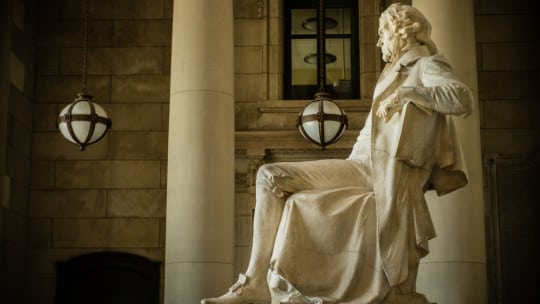
“Congress shall make no law respecting an establishment of religion, or prohibiting the free exercise thereof; or abridging the freedom of speech, or of the press; or the right of the people peaceably to assemble, and to petition the government for a redress of grievances.” – The First Amendment to the Constitution of the United States (1791)
PR pros can view a recent effort to rally support for freedom of the press—on an August 15 challenge from The Boston Globe, 350+ newspapers across the country ran editorials espousing the importance of a free press—as a glass half-empty or half-full situation.
The half-full glass perspective: Yes, it’s terrific to see a groundswell for The First Amendment, a principle that in many cases separates the way this country’s media practices its craft from how it’s done in other democracies. (If you have a chance, ask First Amendment lawyers to compare press freedoms in Britain and France to those in the U.S. You’ll be in for an interesting conversation.)
The press, of course, is not blameless. It is made of humans who make mistakes. Some of them also miss important stories and points, play favorites and concentrate on social media shares to the detriment of hard-hitting reporting. Some media members have an agenda without admitting it; more than a few make life miserable for PR pros.
A Concerted Effort
That's why it is important to see PR trade associations, including PRSA, The Arthur W. Page Society, The Arthur W. Page Center for Integrity in Public Communication, The Institute for Public Relations, The PR Council, The Public Relations Society of America, The Commission on Public Relations Education, The Global Alliance for Public Relations and Communications Management and The International Association of Business Communicators join the chorus for a free press.
Those groups issued a statement today that began with a quote from Thomas Jefferson: "The basis of our governments being the opinion of the people, the very first object should be to keep that right; and were it left to me to decide whether we should have a government without newspapers or newspapers without a government, I should not hesitate a moment to prefer the latter."
Using the Jefferson quote was brilliant. Without referring to President Trump’s characterizations of the press as "the fake news media" and “the enemy of the people,” the statement used Jefferson to allude to President Trump and make its point: “The dramatic expression by a founding father who was brutally criticized by the media of his time underscores that the standing of a free press transcends politics, geographies or other affiliations.”
The statement ended with, "We collaboratively declare our support for journalists who bravely seek the truth, focus on facts, and hold government, business and other institutions accountable."
The Boston Globe, which was sold to the the Failing New York Times for 1.3 BILLION DOLLARS (plus 800 million dollars in losses & investment), or 2.1 BILLION DOLLARS, was then sold by the Times for 1 DOLLAR. Now the Globe is in COLLUSION with other papers on free press. PROVE IT!
— Donald J. Trump (@realDonaldTrump) August 16, 2018
The half-empty glass includes several elements. One part of the half-filled glass contains people upset about why it is even necessary to defend press freedoms.
Belief Systems
Yes, a free press is a bedrock of the country, but this republic's voting system elected a president who promised to disrupt. And the president's attacks on media, including the tweet above, have found followers. For example, a Quinnipiac University poll released August 14 showed 51% of Republican voters believe "the media is the enemy of the people rather than an important part of democracy." It also noted 36% of GOP voters believe the media is "an important part of democracy."
An Ipsos poll last month found 26% of Americans think President Trump should be able to shut down mainstream media outlets such as CNN and The NY Times that engage in "bad behavior."
The remaining liquid in the half-full glass questions why it took so long for a concerted effort to defend the press to be mounted.
New Era?
The PR News site has run occasional articles about how PR and media, particularly earned media, are two sides of the same coin. This site also has published articles about how brands can deal with fake news. We noted PRSA chair Anthony D’Angelo’s spirited response to a syndicated columnist’s characterization of PR as a profession of paid liars. The columnist, Virginia Heffernan, was writing after Hope Hicks left her post as White House communications director and allegedly admitted “white lies” to the press were part of her job. We covered the House candidate from Montana who, in 2017, body-slammed a reporter prior to a press conference rather than answer his question. This site also discussed the rise of #alternativefacts and their meaning for PR and admired Jane Dvorak, D'Angelo's predecessor, for her early criticism of #alternativefacts.
But we didn’t cover any large-scale efforts to defend press freedoms; there were none.
Are today’s newspaper editorials the start?
Seth Arenstein is editor of PR News. Follow him: @skarenstein
